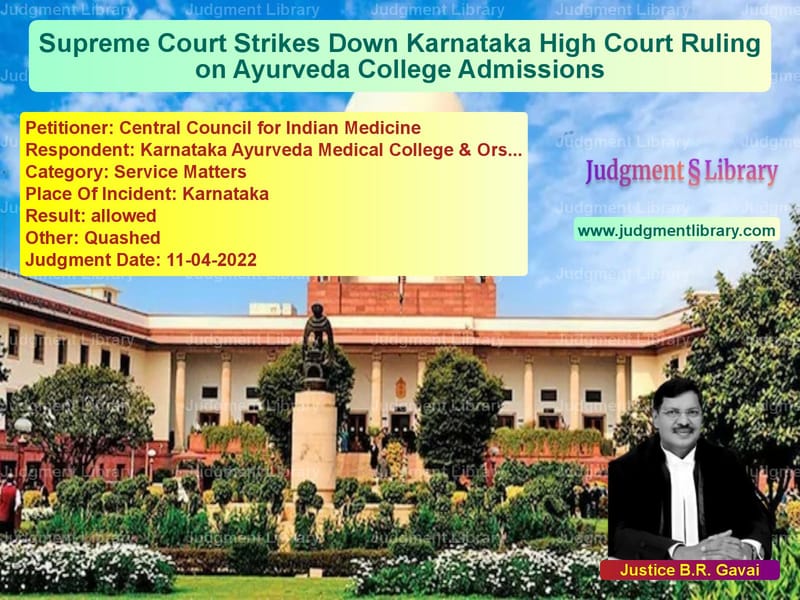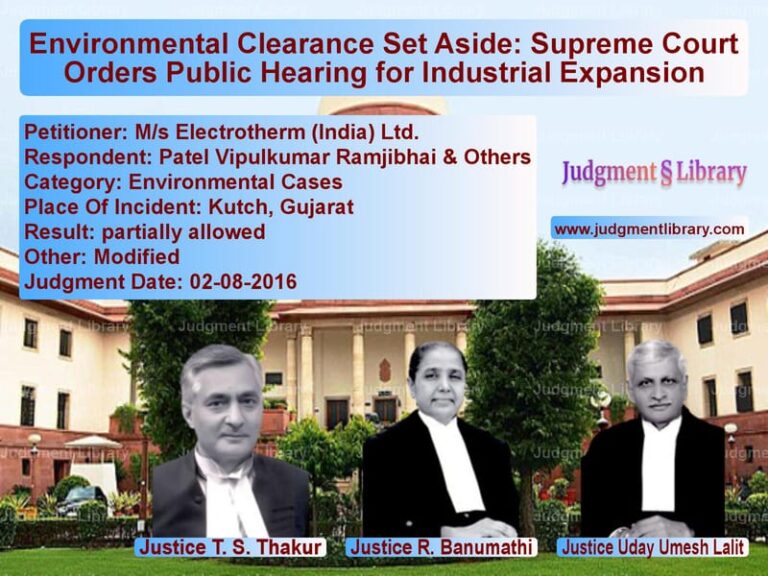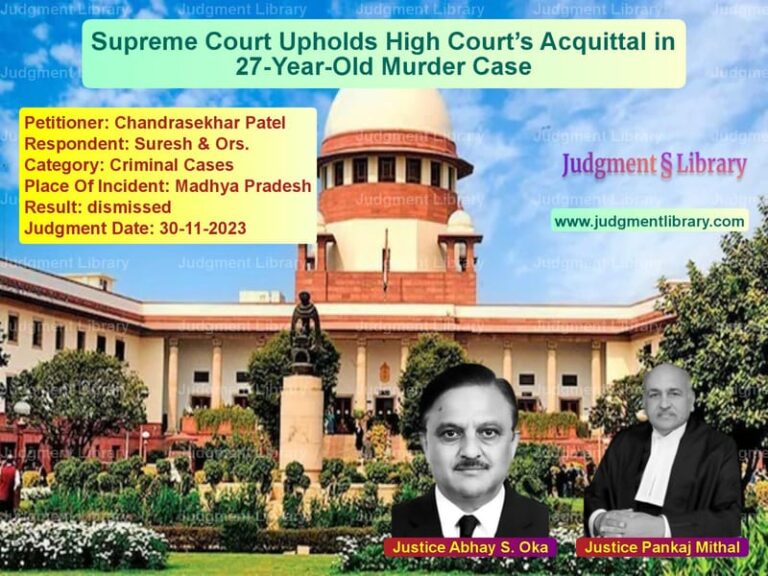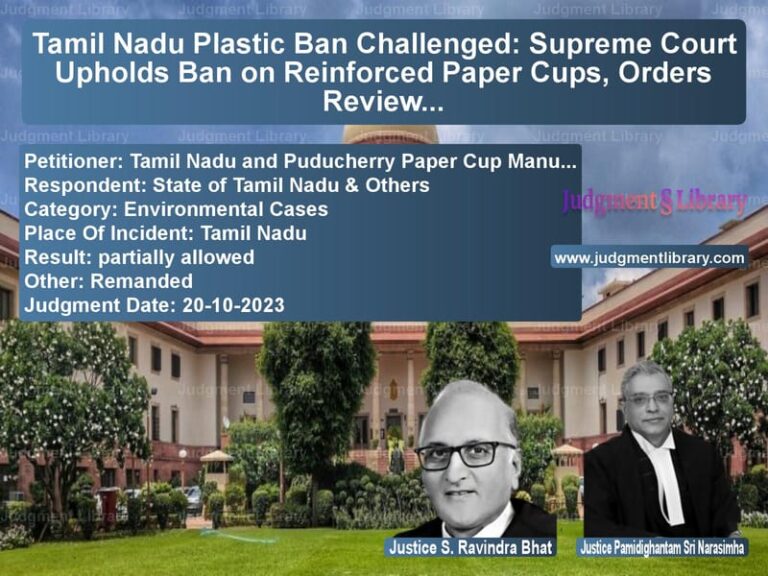Supreme Court Strikes Down Karnataka High Court Ruling on Ayurveda College Admissions
The Supreme Court of India recently delivered a crucial judgment in Central Council for Indian Medicine vs. Karnataka Ayurveda Medical College & Ors., overturning a Karnataka High Court decision regarding the admission of students in Post-Graduate Ayurveda courses without fulfilling regulatory standards. The case revolved around whether an institution could admit students for an academic year despite failing to meet the minimum infrastructure and faculty requirements as per the Indian Medicine Central Council Act, 1970 and the Post-Graduate Ayurveda Education Regulations, 2016.
Background of the Case
The Karnataka Ayurveda Medical College (respondent) applied to the Central Council for Indian Medicine (CCIM) for permission to start new Post-Graduate courses in Ayurveda for the academic year 2014-15. Initially, the CCIM granted permission for five disciplines with five seats each under the 2012 Ayurveda Education Regulations. However, the 2012 regulations were later replaced by the 2016 Ayurveda Education Regulations, which imposed new requirements, including:
- A Central Research Laboratory
- An Animal House (either owned or through collaboration with another institution)
The Karnataka Ayurveda Medical College collaborated with another institution to use its Animal House and continued receiving approvals for 2016-17 and 2017-18. However, upon an inspection in 2018, the Union of India and CCIM found deficiencies and denied permission to admit students for the academic year 2018-19 due to non-availability of a Central Research Laboratory and an Animal House.
Despite this, the Karnataka High Court allowed the college to admit students based on the reasoning that the institution was later granted permission for 2019-20. The CCIM challenged this ruling before the Supreme Court.
Legal Issues
- Whether an institution failing to meet the required infrastructure and faculty standards in an academic year can admit students based on approvals granted in subsequent years.
- Whether the Karnataka High Court erred in granting retrospective permission for admissions despite the institution’s failure to meet the minimum required standards in the relevant academic year.
- Whether the refusal to permit admissions for 2018-19 was justified under the 2016 Regulations.
Arguments by the Parties
Appellant’s Arguments (CCIM and Union of India)
- The appellants contended that the 2016 Regulations mandated minimum infrastructure and faculty standards, and failure to meet them in any academic year justified the denial of permission.
- They argued that approvals granted for later years could not retrospectively validate admissions for a previous year.
- The appellants pointed out that Sections 13A and 13B of the Indian Medicine Central Council Act explicitly prohibit granting permission unless institutions meet prescribed minimum standards.
- The Karnataka High Court had erroneously relied on prior High Court decisions rather than Supreme Court precedents.
Respondent’s Arguments (Karnataka Ayurveda Medical College)
- The respondent argued that it had already rectified the deficiencies when it received permission for 2019-20.
- They contended that since the college was granted approval for subsequent years, the same logic should apply to the previous year.
- The college cited earlier High Court decisions, which allowed students to be admitted even when permission was granted later.
Supreme Court’s Judgment
Key Observations
- The Supreme Court ruled that an institution must meet minimum standards for each academic year and that permission for later years does not retrospectively validate past admissions.
- The Court emphasized that the 2016 Regulations set clear guidelines requiring institutions to have essential infrastructure in place by December 31 of the preceding year to qualify for admissions.
- It held that the Karnataka High Court erred in ignoring the Supreme Court’s earlier ruling in Ayurved Shastra Seva Mandal vs. Union of India, which rejected retrospective approvals.
- The Court clarified that post facto approvals undermine the regulatory framework and lead to dilution of educational standards.
Final Decision
The Supreme Court quashed the Karnataka High Court’s ruling and upheld the CCIM’s decision to deny permission for the academic year 2018-19. The Court ruled:
“An institution cannot claim permission for a past academic year merely because it was granted permission in subsequent years. Compliance with prescribed standards must be met for each academic year separately.”
Implications of the Judgment
For Educational Institutions
- The ruling reaffirms that institutions must comply with infrastructure and faculty requirements before admitting students.
- It ensures that quality control mechanisms in Ayurveda education remain intact.
- The decision discourages institutions from circumventing regulations by seeking retrospective approvals.
For Medical Education
- The judgment strengthens regulatory oversight over Ayurveda and other traditional medicine education.
- It ensures that students receive training in properly equipped institutions.
For Future Legal Precedents
- The ruling clarifies that High Courts must follow Supreme Court decisions regarding regulatory compliance.
- It establishes that compliance must be assessed on a year-to-year basis, not on future approvals.
Conclusion
The Supreme Court’s judgment in Central Council for Indian Medicine vs. Karnataka Ayurveda Medical College is a significant step in ensuring regulatory compliance in Ayurveda education. By rejecting retrospective approvals, the Court has reinforced the importance of meeting minimum infrastructure standards before admitting students. This decision will serve as a benchmark for future cases concerning educational regulations and institutional accountability.
Petitioner Name: Central Council for Indian Medicine.Respondent Name: Karnataka Ayurveda Medical College & Ors..Judgment By: Justice B.R. Gavai.Place Of Incident: Karnataka.Judgment Date: 11-04-2022.
Don’t miss out on the full details! Download the complete judgment in PDF format below and gain valuable insights instantly!
Download Judgment: central-council-for-vs-karnataka-ayurveda-m-supreme-court-of-india-judgment-dated-11-04-2022.pdf
Directly Download Judgment: Directly download this Judgment
See all petitions in Education Related Cases
See all petitions in Recruitment Policies
See all petitions in Public Sector Employees
See all petitions in Judgment by B R Gavai
See all petitions in allowed
See all petitions in Quashed
See all petitions in supreme court of India judgments April 2022
See all petitions in 2022 judgments
See all posts in Service Matters Category
See all allowed petitions in Service Matters Category
See all Dismissed petitions in Service Matters Category
See all partially allowed petitions in Service Matters Category







